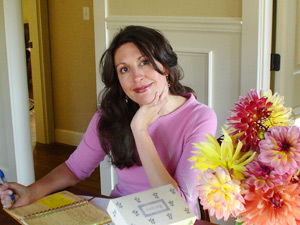When I (Nicole this week) was young and fresh out of college, I wanted to learn to be a better cook. I turned to recipes as road maps for learning exotic dishes as well as new techniques. Later on, I myself would become a recipe developer, an endeavor I found endlessly creative. I never knew what the next assignment would be: 5-ingredient mole sauce? 30-minute chicken dinners? Lowfat lasagna? Vegan brownies? Dairy-free lobster bisque? I adored coming up with new recipes.
But I’ll tell you a secret—cooking seemed easy to me. Once I mastered a new technique, such as searing scallops without overcooking them, I felt free to improvise. I suppose this is why people say cooking is so creative—you can venture off the path of the original recipe and still get to a perfectly delightful destination. The flavor aspect almost always seems to work out. Meatloaf, lasagna, barbecue, and many beloved favorites can hold endless variety of ingredients and still taste like they are supposed to. Scratch cooking is by nature “sustainable”—using up what’s on hand in fun and inventive ways. I have this soup that I call “Cream of Spinach Soup” that a good fifty percent of the time doesn’t contain spinach. Rather, it’s a catch-all soup filled with greens at hand . . . be it lettuces, arugula, chard, kale, parsley, tat soi, watercress, even collard greens. But, and this is where learning some basic technique comes in handy, every variation is still delicious and recognizably the same dish, thanks to a stable base of onions, garlic, celery, green peas, stock, cream, and nutmeg.
Now, in baking, I can certainly make something that’ll use up a glut of ripe bananas or zucchini. Of course, I can, and have many times. Sustainable, yes, but in my heart of hearts, I bake for the most selfish of reasons, to satisfy my deep craving for that perfect something sweet that hits the spot right now. And, if I’m going consume the calories associated with real butter and sugar, it had better be worth it. So, once I’ve determined exactly what I’m in the mood for, I set off with a recipe in hand. Why a recipe, you ask?
Because baking is nothing like cooking
With just 4 primary ingredients –flour, sugar, eggs, milk, and butter— a good baker can achieve a staggering variety of textures and flavors by combining them in different ways. Crunchy, buttery shortbread to flaky puff pastry to moist, tender cake, such magic is possible only when you follow a recipe and, in most cases, follow it quite closely. It is not advisable to play fast and loose with ingredient ratios and specified techniques. Flour, for example: three tablespoons can transform a pint of thin sauce into thick gravy. Too much flour in your cake or bread or cookies, and you’ll not only miss the Platonic ideal, the recipe may actually fail miserably. In my search for that sublime union of flavor and texture, I am very careful about changing a good basic baking recipe. But, as a baker who just happens to be a recipe developer by trade, I’ll admit to some pretty serious tinkering over the years. My Holy Grail is the unending pursuit of the perfect chocolate chip cookie recipe, countless variations since the age of 8 and still going. Some days you want moist and chewy, some days you want thin and crisp on the edges. And speaking both professionally and personally let me tell you it is very important to record every change! Lisa swears version #4 of a pecan sandy was perfection, but I have never been able to replicate it exactly. Why? I didn’t write it down.
Next week: In Praise of Corn: TwoJunes examine the long and truly symbiotic relationships between an humble grain and its human protector, corn syrup is just the latest kink in an improbable shared history. A displaced southerner, Lisa, longs for the first corn of the summer, but in the meantime, shares some hominy and grits recipes, because a table without corn just doesn’t seem right.
Lisa Bell is a freelance producer, writer and editor. She spent the first fifteen years of her working life as a pastry chef, recipe developer, test kitchen director, food stylist and print editor. She has also taught cooking classes, run a small cooking school, and worked as a food scientist. Nicole Rees currently works as a baking scientist. She is also a food writer and cookbook author specializing in baking science. Her most recent book Baking Unplugged, is filled with simple, scratch recipes that require no electric gadgets beyond an oven.


